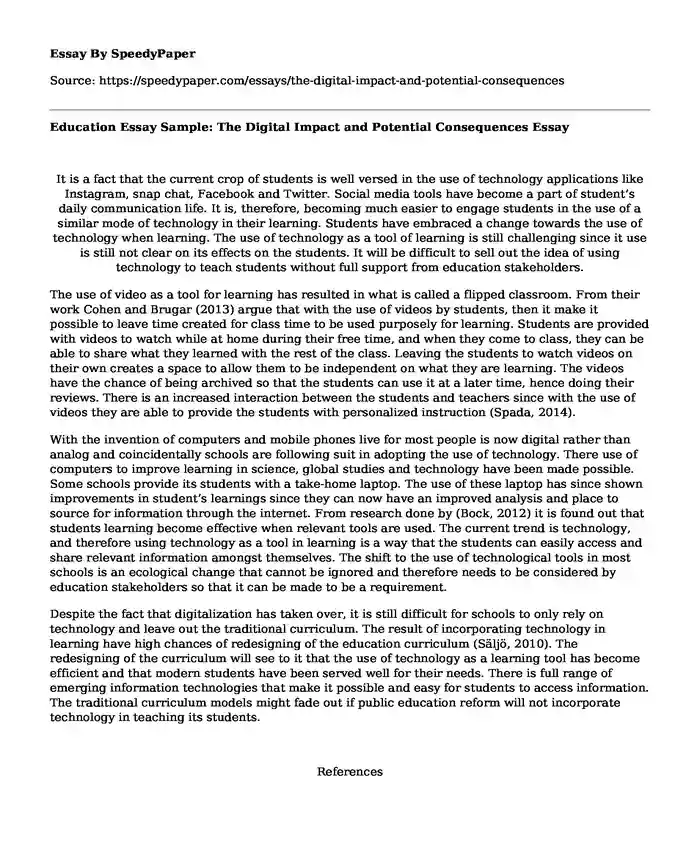
| Type of paper: | Essay |
| Categories: | Education Technology Social media |
| Pages: | 3 |
| Wordcount: | 677 words |
It is a fact that the current crop of students is well versed in the use of technology applications like Instagram, snap chat, Facebook and Twitter. Social media tools have become a part of student’s daily communication life. It is, therefore, becoming much easier to engage students in the use of a similar mode of technology in their learning. Students have embraced a change towards the use of technology when learning. The use of technology as a tool of learning is still challenging since it use is still not clear on its effects on the students. It will be difficult to sell out the idea of using technology to teach students without full support from education stakeholders.
The use of video as a tool for learning has resulted in what is called a flipped classroom. From their work Cohen and Brugar (2013) argue that with the use of videos by students, then it make it possible to leave time created for class time to be used purposely for learning. Students are provided with videos to watch while at home during their free time, and when they come to class, they can be able to share what they learned with the rest of the class. Leaving the students to watch videos on their own creates a space to allow them to be independent on what they are learning. The videos have the chance of being archived so that the students can use it at a later time, hence doing their reviews. There is an increased interaction between the students and teachers since with the use of videos they are able to provide the students with personalized instruction (Spada, 2014).
With the invention of computers and mobile phones live for most people is now digital rather than analog and coincidentally schools are following suit in adopting the use of technology. There use of computers to improve learning in science, global studies and technology have been made possible. Some schools provide its students with a take-home laptop. The use of these laptop has since shown improvements in student’s learnings since they can now have an improved analysis and place to source for information through the internet. From research done by (Bock, 2012) it is found out that students learning become effective when relevant tools are used. The current trend is technology, and therefore using technology as a tool in learning is a way that the students can easily access and share relevant information amongst themselves. The shift to the use of technological tools in most schools is an ecological change that cannot be ignored and therefore needs to be considered by education stakeholders so that it can be made to be a requirement.
Despite the fact that digitalization has taken over, it is still difficult for schools to only rely on technology and leave out the traditional curriculum. The result of incorporating technology in learning have high chances of redesigning of the education curriculum (Säljö, 2010). The redesigning of the curriculum will see to it that the use of technology as a learning tool has become efficient and that modern students have been served well for their needs. There is full range of emerging information technologies that make it possible and easy for students to access information. The traditional curriculum models might fade out if public education reform will not incorporate technology in teaching its students.
References
Cohen, S., & Brugar, K. (2013). I want that... flipping the classroom. Middle Ground, 16(4), 12.
Dowse, R. J. (2012). The Laie Hawaii Temple: A History from Its Conception to Completion.
Greenhow, C., Robelia, B., & Hughes, J. E. (2009). Learning, teaching, and scholarship in a digital age Web 2.0 and classroom research: What path should we take now? Educational researcher, 38(4), 246-259.
Säljö, R. (2010). Digital tools and challenges to institutional traditions of learning: technologies, social memory and the performative nature of learning. Journal of Computer Assisted Learning, 26(1), 53-64.
Spada, K. (2014). Higher Education in the Digital Age [Book Review]. IEEE Transactions on Professional Communication, 57(2), 150-153.
Cite this page
Education Essay Sample: The Digital Impact and Potential Consequences. (2017, Oct 16). Retrieved from https://speedypaper.com/essays/the-digital-impact-and-potential-consequences
Request Removal
If you are the original author of this essay and no longer wish to have it published on the SpeedyPaper website, please click below to request its removal:
- Essay Sample about Mountains Beyond Mountains
- Free Essay Comprising the Arguments on Elderly Cancer Treatment
- Marketing Essay Example: Product Placement
- Essay Sample Describing Weather History and Geology of Pali Hawaii
- Literary Analysis Essay of The Yellow Wallpaper, Free Example
- The Free Essay About Findings and Recommendations for Skrillics
- Essay Sample on Branding Strategy in Marketing: Starbucks Backgrounder
Popular categories




